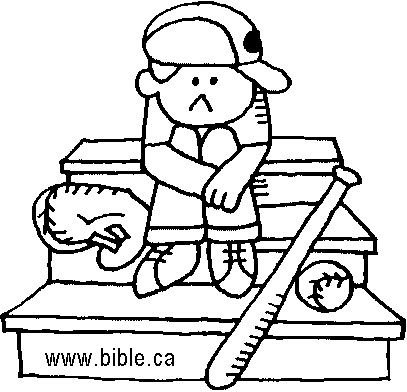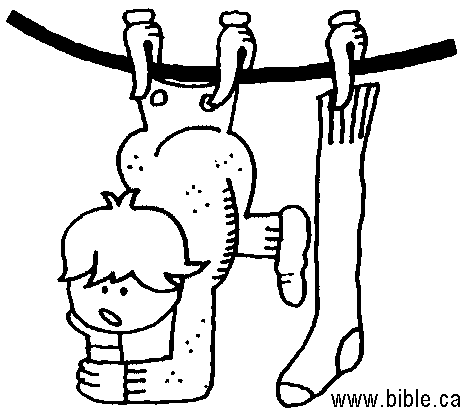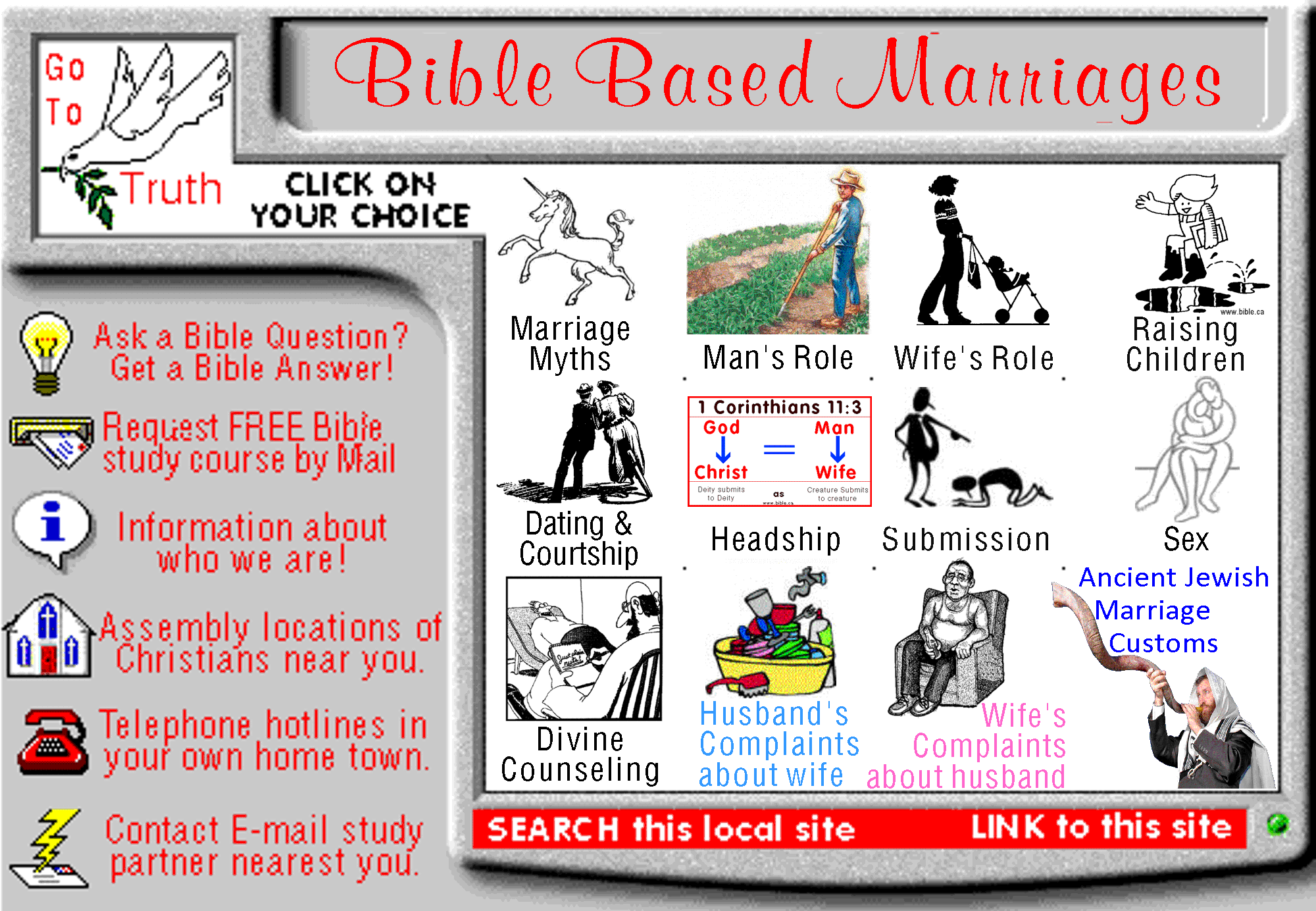Everything You Ever Needed To Know About Raising God-Fearing Kids!
The Parent's Pledge poem:
Children are a heritage of the Lord. The fruit of the womb is His reward. A teacher's certificate I do not need. If I ask for wisdom God gives it liberally. To teach our children is not a chore. God's commandments we adore. We'll write His words upon their hearts and never from them will they depart. and when they go through this life, wondering what path to take, if they will do all in the name of the Lord, he will never forsake. The parents of this generation and generations to come will sing praises to the Lord for the great works He has done. And remember each day as we teach His way, God seeks a godly offspring.(By Mary Morr)
Introduction
A. Parents are entrusted with a soul of great value: Mt 16:26.
B. Paradox of parenthood:
1. Dentists, doctors and layers go to school for 7 years; Specialists for 10 years.
2. Parenting is far more important and has little formal training.
3. About the time we have the experience, we are out of business.
C. Children will ultimately be responsible for their own eternal destinies; Ezek 18:20.
1. God has ordained that children are to be obedient and respectful:Eph.6:1-3;Col3:20; Prov. 4:1.
2. Children have the responsibility to serve God without any parental help:Eccl 12:1; Ps 119:9-16.
3. Children reap what they sow: Gal.6:7,8; Prov. 4:1-27.
4. Yet, parents will answer for failure to train their children: Eph 6:4.
D. The home is testing ground for elders; forms basis of ultimate example: 1 Tim 3:4-5
E. It is possible to guarantee a child will grow up righteous:
1. Train a child when young...old not depart. Prov 22:6
2. Qualification of elder is raise believing children, Qualifications are not by chance. Tit 1:5-6.
F. Time is short
- If child doesn't respect and fear authority by age 2, there are big troubles ahead!
- A child's basic character is entrenched by age 6.
G. Training children involves three things: positive instruction, example and discipline.
I. Planning For Children:
A. Openly discuss having children with your spouse, even before marriage:
1. Often one spouse can tend to avoid the subject, this is poor communication.
B. Having Children will not resolve marital conflict only highten it.
C. Wait a period of time after marriage to allow for adjustments: Duet 24:5.
D. Are you financially able to provide for a family: 1 Ti 5:8.
II. The Bible And Disciplining Of Children:
Exercise:
Read each verse and fill in the important part of the text in blank space
A. General Proverbs About Correction And Reproof:
- Prov 3:12
- Prov 10:17
- Prov 12:1
- Prov 15:10
- Prov 15:12
- Prov 15:32
- Prov 27:5
- Prov 29:1
- Prov 20:30
- Eccl 7:5
- Mt 18:15-17
- 1 Cor 4:21
- Heb 12:5-13
B. Proverbs Especially For Parents:
- Prov 13:24
- Prov 19:18
- Prov 22:6
- Prov 22:15
- Prov 23:13-14
- Prov 29:15
- Prov 29:17
- Eph 6:4
C. Proverbs Especially For Children:
- Prov 1:8-9
- Prov 13:1
- Prov 15:5
- Prov 23:22
- Prov 28:7
- Prov 30:11
- Eccl 12:1
- Eph 6:1-4
- Col 3:21
- 1 Tim 5:4
- Deut 21:18-21
- Prov 30:17
- Lev 20:9
- Ex 21:15
III. The Bible father who wouldn't discipline his children:
A. Eli and his two sons:
B. Their sin: 1 Sam 2:12-17,22
C. Eli's reaction: 1 Sam 2:23-25,29
1. Words only, no action
2. By this time it was too late! The battle was lost when they were 4-6 years old
D. God's judgment; 1 Sam 2:34; 3:11-14
1. "He did not rebuke them"
IV. Things To Avoid:
A. Favoritism: Who's the favorite kid or parent?
1. Jacob and Joseph: Gen 37:3-4
2. NT teaching: Jas 2:1,6,7
B. Emphasizing externals rather than Character:
1. Achievement oriented rather than character oriented: 1 Sam 15:22-23
2. Focusing of outward beauty, clothing & jewelry vs. inward spirit: 1 Sam 16:6-7; 1 Pet 3:3-4
3. More concerned with scholastic achievement than with behavior and social skills
C. Bad friends and playmates will create problems in your child: 1 Cor 15:33
D. Fully sheltering them from the world and all evil influence: 1 Cor 5:9-10
E. Failing to take into consideration that children are not adults:
1. Disciplining for things that are typical of their age but very frustrating to parents:
a) 1 Cor 13:11 "spoke, thought and reasoned as a child" Children are children!
b) Children often do things that are foolish because they are irresponsible and immature.
c) Examples:
(1) Spilling grape juice on the white rug
(2) Getting crayon on the table when they missed the page, paint faces
(3) Not having a deep, quiet conversation with the neighbors 4 year old!
2. Giving too much or too little responsibility or freedom:
a) The process from cradle to adulthood is a series of small increases of responsibility
b) Too much: children tend to feel neglected and uncared for...and get themselves in trouble
(1) Jesus & Paul understood the limits of spiritual children: Jn 16:12-13; 1 Cor 3:1-2
(2) Age 2-3 can handle 2 different commandments at one time; 4-5 about 3; 6-8 about 4
c) Too little: Teens feel resentful and will rebel
F. Making threats that are unreasonable and you know you won't carry through with:
1. "I'll ground you for 6 months if you don't clean up your room today"
G. Losing your temper or yell at them insanely: Eph 5:26; Jas 1:19; Prov 15:18
H. Do not interfere when your spouse disciplines:
1. When punished, children will run to the other parent's lap for a hug and comfort.
a) The child is manipulating this parent and the hug tells the child the other parent was wrong
b) Do not hug the child until after the child has reconciled with the parent who disciplined
2. Parents must be aware of this and work together.
3. Arguing in front of the kids gives mixed signals and erodes their confidence in both parents
4. Two heads are better then one, take each others viewpoint into consideration, be humble
5. Give more weight to the parent who is not involved in the heat of the problem directly.
I. Never differ over discipline with spouse in front of the children: Mk 3:25
|
J. Being too critical: you can break the child's "spirit" and cause depression: Col 3:21
1. Children at 8, for example tend to already be self-critical
|

|
V. Things To Do:
A. Have a clear set of rules and boundaries the child fully knows and understands
1. Interestingly, transgression is going outside of God's boundaries.
2. Enlist the help of each partner to make the boundaries. Agree upon them.
3. Revise your boundaries year by year with age.
4. Communicate each child's boundaries with (ie.) grandparents to prevent some problems
5. Establish specific penalties for specific violations: (ie. Any lying=instant spanking)
6. Children feel more secure when they have clearly defined bounderies
B. Choose a penalty that fits the crime to bring results : "Crime doesn't pay!"
1. God punishes more severely if we knew something was wrong and how accountable we are:
a) Lk 12:47-48; Mk 12:38-40; Mt 11:21-24; 2 Pe 2:20-21
b) Discipline more severely for repeat offences
c) Do discipline for first time acts but less severely
2. God will punish some sins more severely than others:
a) OT Law: Adultery-death; (Lev 18:20)
b) OT Law: Stealing-restitution 2 times (Ex 22:4)
C. Give a show of love equal to the magnatude of the chosen punishment:
1. Give them a big hug and kiss and tell them you love them after all is finished!
2. Express you love them, "Why does daddy discipline you?" "Because you love me"
3. Children can endure difficult periods of correction when there is love expressed
D. Use a wide variety of disciplining methods:
1. Don't be afraid to spank when necessary.
(Every child on earth has needed at least one good spanking!)
2. Be creative, think of new methods that will be effective.
E. Correct immediately, but not out of anger or frustration
F. Be consistent, Repeat offenses dealt with similarly
G. Follow through with what you said:
1. "You'll be grounded for a day if..." You must carry through with what you said otherwise the children learn your words are hollow and without credibility.
H. Discipline should produce sorrow for doing the deed
1. There is a difference of sorrow for getting caught and sorrow for committing: 2 Cor 7:8-10
I. Carefully explain why the child is being disciplined both before and after!
This ensures the child knows exactly why punished and reinforces through repetition
J. Always relate the problem to what Jesus thinks and what the Bible says about it
1. Ask them what Biblical passages apply?
K. Admit to a child who was unjustly punished that you were wrong in doing so!
1. Parents do make mistakes, sometimes you are forced to decide between two children's different versions of the same story.
2. When you admit you wrongly disciplined unjustly, the child already knows! Admission will create love and respect. Failure to admit will cause bitterness and rebellion
L. Both parents should periodically discuss each child's development!
1. identify specific problems and implement specific plans to combat
M. When there is a conflict in stories between your child and an adult...trust the adult
N. Instill a general respect for all adults, especially their teachers and neighbors
Don't "childproof" your child into disrespecting adult stangers- accept no candy but respect!
VI. Different Methods Of Disciplining:
|
A. Verbal warning or scolding: Minor crimes, first time offenses
B. Isolation: Stand in corner; sit on a chair; send to room; grounding
C. Withdrawal of privileges: something that they wanted...something that hurts!
|

|
D. Imposition of work:
1. punishment that teaches, value of work, responsibility
2. Most children have excessive play time and not enough work time.
3. Great release for summer boredom.
E. Martial discipline or spanking
1. Do not use your hand, but an inanimate object like a wooden spoon, paddle or leather belt.
a) Child should not cringe every time you raise your hand to scratch your ear.
2. Determine exactly how many times you will spank then tell the child.
3. Privately determine how hard you will spank, (no need to tell the child).
4. Do not hit the child anywhere but the fatty behind area, (Do not hit on back or legs).
a) Have the child lie over a chair or bed or lay on top of bed.
5. Generally, a spanking should not leave any marks that persist for more than a few hours.
6. If the child will not co-operate tell them you will add 1 more spank, then follow through.
7. Count out the spanks as you give them.
8. The child will cry, but children are fully capable of crying within control.
a) Wild screaming should not be tolerated but is their way of fighting back and rebelling.
b) Tell them they must not make a lot of noise, (Tell them if they want to scream, they can to scream into a pillow to muffle the sound.)
c) If they will not co-operate, but insist on screaming wildly, warn them before that if they do scream in this manner, you will spank them again. (make sure you follow through).
VII. Suggested Procedure For Disciplining:
A. Determine exactly what the child did
B. Get the child to admit to the deed: (Double punishment if they lie)
1. Discipline is only really effective when the child understands that certain actions are wrong.
C. Get the child to admit they knew it was wrong:
1. Right and wrong is what mommy, daddy, grandparents, teachers and God says.
D. Ask them why they did it
E. Choose a method of discipline that fits the crime and will bring about repentance:
F. Ask them: "If you were a daddy how would you discipline yourself right now?
1. This helps them to clearly see the problem
G. Impose the discipline
H. afterward, ask them again why they were disciplined
I. always reconcile with a big hug and tell them you love them
VIII. Particular Sins To Look Out For:
|
A. Willful rebellion and disobedience
B. Lying
C. Stealing
D. Dirty looks, scowling at parent
E. Talking back
F. Whining and pouting when disciplined: this is a sign that the child has not repented |

|
IX. Battlegrounds:

A. Going to bed:
1. Get the child to agree beforehand what time they will go to bed
2. Set an time clock for young children. Set clock for 15 minutes, "bell means bedtime"
B. The dinner table:
1. Avoid serving them foods they won't like; Tastes develop with age.
2. Generally children will eat as much as they need.
a) Perhaps you put an adult helping on their plate, if you are worried that they are not getting fed enough make them eat as many bites as they are old. young children love this!
b) Get them to serve themselves with the understanding they eat what they take.
c) If they only eat a little, they won't starve by morning.
3. Cut out all snacks, candy & soft drinks after 2PM, these curb appetites:
a) If they say they are not hungry at supper, snacks have curbed their appetite.
b) Then at 7PM "I'm hungry". They really are hungry.
4. Make rule, "Don't finish dinner, no food till morning". (they won't starve, but might remember)
C. Getting up in the morning:
1. Check to see if they are going to bed at a proper time. (bedtime schedule chart)
2. Lack of self discipline
D. Doing chores and Cleaning up their room:
1. Don't pay them for work, expect them to do it as part of their duty
E. Bathing and brushing teeth: Usually need to be told repeatedly-they outgrow
F. Television:
1. Make a rule they are only allowed to watch approved shows that are taped on VCR
2. This cuts out commercials that are often bad and cuts viewing time by 20%
|
X. Your Child's Teacher: The Third Parent |

|
A. Your child's teacher spends same time with your child than you do, 5 days a week!
B. Teachers are able to see your child out of the home environment (the acid test)
1. Your child's true behavior and conduct is seen at school
2. Problems at home become most evident at school
C. Make specific inquiries about your child's behavior and believe what you hear
D. Treat them like a third parent:
1. Work with teachers, support all their disciplining as you would your spouse's
2. Children must know you will abide by their teachers decisions and judgments
3. If a child knows you are at odds with teacher: same problem as parent (rebellion)
XII. Spiritual training and influence of example
A. We need to give them spiritual training: 2 Tim 3:15; Deut 6:6-9.
1. Daily Bible reading and prayer before bed or before school.
2. Weekly devotionals with singing, Bible study and prayer in home.
B. Training children involves three things: positive instruction, example and discipline.
1. A lesson on honesty falls flat when child hears dad lie to get out of ticket.
2. Hypocrisy obvious when dad sleeps through sermons then say, "good lesson preacher".
3. Child hears gossip and slander in back seat of car on the way home from church.
4. No wonder children grow up saying, "My parents forced me to go and I don't have to now".
C. Some sins of the parent are transmitted to the children: Num 14:18
1. Alcoholism & smoking, physical and sexual abuse, poor work ethic, "the cycle of poverty" Spiritual indifference
CONCLUSION:
A. Parents who use the Bible's standard of discipline will be much better off in the end:
1. Good children do not just happen; they're the result of careful cultivation. Isaiah 54:13.
B. Poem:
|
TO OUR CHILDREN
Ps 127:3-6
Your children are not your children,
They are the sons and daughters
Of life's longing for itself;
They come through you but not from you
And though they are with you,
They belong not to you;
You may give them your love
But not your thoughts,
Because they have their own thoughts;
You may house their bodies,
But not their souls;
Their souls dwell in the house of tomorrow,
Which you cannot enter,
Not even in your dreams;
You may strive to be like them
But seek not to make them like you;
For life goes not backwards
Nor tarries with yesterday;
Your are the bow from which your children
As living arrows are sent forth;
Let the bending in the archer's hand be for gladness
A Parent
|
Steve Rudd

Go To Start: WWW.BIBLE.CA

![]() Planning For Children
Planning For Children![]() The Bible And Disciplining Of Children
The Bible And Disciplining Of Children![]() The father who wouldn't discipline his children
The father who wouldn't discipline his children![]() Things To Avoid
Things To Avoid![]() Things To Do
Things To Do![]() Different Methods Of Disciplining
Different Methods Of Disciplining![]() Suggested Procedure For Disciplining
Suggested Procedure For Disciplining![]() Particular Sins To Look Out For
Particular Sins To Look Out For![]() Battlegrounds
Battlegrounds![]() Your Child's Teacher: The Third Parent
Your Child's Teacher: The Third Parent![]() Spiritual training and influence of example
Spiritual training and influence of example![]() Poem to our children
Poem to our children




